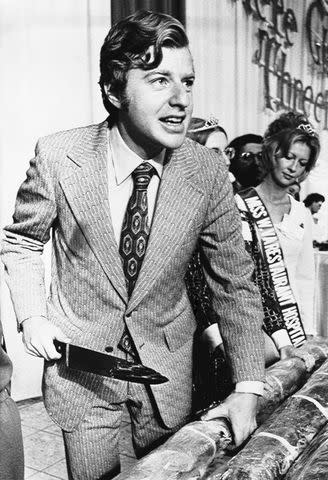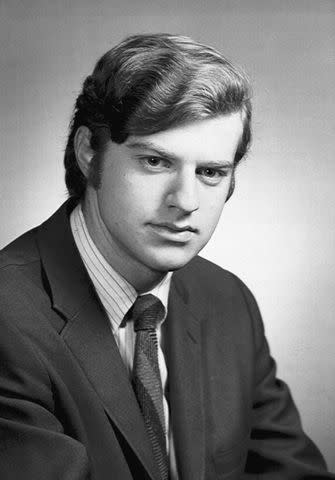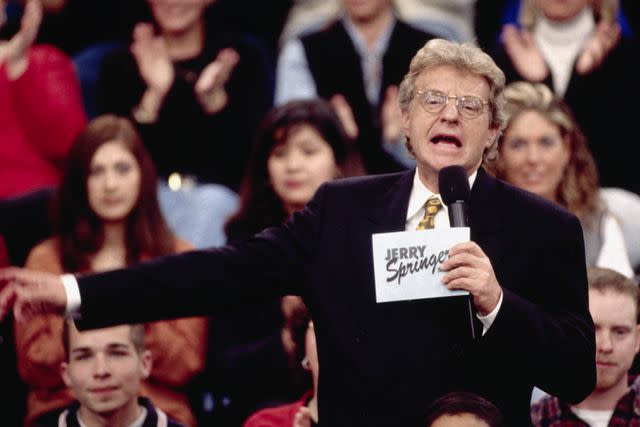A Look Back on Jerry Springer's Forgotten Political Career, from Advising RFK to Serving as Cincinnati Mayor
Springer's career in politics took off decades before he entered the television industry, leading to multiple campaigns for both local and national political office

Jerry Springer died on Thursday at the age of 79, with PEOPLE confirming that the celebrated talk show host was diagnosed with pancreatic cancer shortly before his death.
"Jerry's ability to connect with people was at the heart of his success in everything he tried whether that was politics, broadcasting or just joking with people on the street who wanted a photo or a word," family friend and spokesman Jene Galvin said in a statement to PEOPLE. "He's irreplaceable and his loss hurts immensely, but memories of his intellect, heart and humor will live on."
The statement continued, "Funeral services and a memorial gathering are currently being developed. To remember Jerry, the family asks that in lieu of flowers you consider following his spirit and make a donation or commit to an act of kindness to someone in need or a worthy advocacy organization. As he always said, 'Take care of yourself, and each other.'"
While Springer is best known for his eponymous talk show, he also had a mildly successful political career. Here's what to know about his early beginnings, before The Jerry Springer Show.
Related:Jerry Springer's Life in Photos
He Studied Political Science and Got a Job Working for RFK
Springer attended Tulane University in the 1960s, ultimately earning a bachelor's degree in political science before attending law school at Northwestern University in 1968.
Later, he worked as a political campaign adviser to Democrat Robert F. Kennedy, the younger brother of late President John F. Kennedy and a New York senator and former U.S. attorney general. RFK announced his decision to run for the nation's highest office in March 1968 — five years after JFK was assassinated as commander-in-chief.
In June 1968, Kennedy himself was assassinated.

He Had a Stint in Law and Failed Congressional Campaign
Following Kennedy's assassination in 1968, Springer began practicing law at a Cincinnati law firm. But his political ambitions persisted, and in 1970, Springer ran for Congress as a Democrat.
His political dreams would be short-lived when, just three days after announcing his candidacy, Springer — then an Army reservist — was called to active duty at Fort Knox.
Upon his discharge four months later, Springer resumed his bid for Republican Rep. Donald Clancy's seat, and lost — but by a slim margin, with 45% of the vote in a traditionally Republican district.
Related:Jerry Springer Once Called the TV Show That Made Him Famous 'Stupid': 'I've Ruined the Culture'
A Sex Scandal Disrupted His City Council Tenure
In 1971, Springer ran for a Cincinnati city council seat and won, later earning enough reelection votes to be named vice-mayor.
Springer, then 30, resigned from his city council position in 1974, after news reports suggested he had paid for sex at a brothel using checks. One day after his resignation, Springer said at a press conference: "When I resigned yesterday, I did so because I believed then as I believe now that there are some problems which are better faced as a private citizen."
He later testified at the trial of three men accused of operating the Kentucky "health club" where Springer had admitted to visiting twice for sex. On the stand, Springer said he wrote two checks, in the amounts of $25 and $50, in exchange for sex.
He never faced charges himself, and continued to further his political ambitions, ultimately being reelected to his city council seat in 1975.

He Became Mayor of Cincinnati in 1977
In 1977, Springer was selected by fellow city council members to serve as mayor of Cincinnati for a one-year term.
Springer served as the 56th mayor of Cincinnati from 1977 to 1978 and later made an unsuccessful bid for Ohio governor as the Democratic candidate in 1982, not shying away from the scandal that had plagued his career years earlier.
"Nine years ago I spent time with a woman I shouldn't have. And I paid her with a check. I wish I hadn't done that," Springer said in a campaign ad, per The New York Times. "And the truth is, I wish no one would ever know. But in the rough world of politics, opponents are not about to let personal embarrassments lay to rest."
But when that campaign didn't result in a victory, he went in a new direction — television.

His Move to Television
Springer got a job as a political reporter and commentator at NBC's Cincinnati affiliate, WLWT, thanks to well-received commentaries he did during his mayoral term called "The Springer Memorandum" on radio station WEBN-FM.
Springer would go on to win 10 local Emmys for his work with the station and in 1991, Cincinnati-based Multimedia Entertainment announced daytime program The Jerry Springer Show. The show began as a hard news show but evolved over time to cover, as Springer himself would say in alter interviews, "crazy."
The Jerry Springer Show ran for 27 seasons, until 2018.
Never miss a story — sign up for PEOPLE's free daily newsletter to stay up to date on the best of what PEOPLE has to offer, from juicy celebrity news to compelling human interest stories.
He starred in the reality TV series Judge Jerry following the end of his talk show. At the time, Springer joked to PEOPLE the judging series was his first "grown-up job" in the 30 years since The Jerry Springer Show began.
Even while working in television, though, Springer's interest in politics never faded.
"I'm a political junkie, so that's my interest," he told Huffington Post in a 2011 interview. "I'm liberal, but I watch the three majors. Obviously I watch MSNBC, also CNN and Fox, which is what I would call ridiculously to the right."
Asked which he would consider more dangerous — Fox News or his eponymous talk show — Springer responded: "Well Fox, because it has more consequence. Our show is obviously silly. People on our show get angry, but the next day they're dating someone else. It's never taken health care from anyone. It's never put us into a war."
For more People news, make sure to sign up for our newsletter!
Read the original article on People.

 Yahoo News
Yahoo News 
